

Of01 360. Canada releases list of 31 critical minerals; domestic production, global impact. Canada has released a list of 31 minerals considered critical for the sustainable economic success of Canada and its allies—minerals that can be produced in Canada, are essential to domestic industry and security and have the potential to support secure and resilient supply chains to meet global demand.
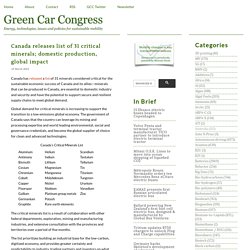
Global demand for critical minerals is increasing to support the transition to a low emissions global economy. The government of Canada says that the country can leverage its mining and processing expertise and world leading environmental, social and governance credentials, and become the global supplier of choice for clean and advanced technologies.
The critical minerals list is a result of collaboration with other federal departments, exploration, mining and manufacturing industries, and extensive consultation with the provinces and territories over a period of five months. Further developing its critical mineral offer could bring numerous benefits to Canada, ROskill said. Mission critical - Governments identify minerals needed for economic and national security. CUT DEEP into the desert rock of southern California are the jagged tiers of an open-pit mine.
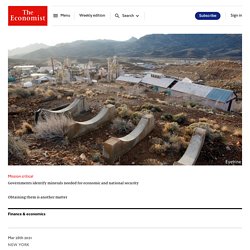
Mountain Pass is North America’s only mine of rare-earth metals, used in everything from fighter jets to the drivetrains of electric cars. In 2015 Mountain Pass shut, unable to compete with rare-earth producers in China. But the mine has begun a new chapter. MP Materials, which bought the mine in 2017, said on March 18th that production in 2020 jumped by 40%. More expansion is planned. America’s support of Mountain Pass points to a broader phenomenon. In February Joe Biden’s White House issued an executive order to review the vulnerability of supply chains key to economic and national security, including critical minerals and batteries. America long guarded against supply disruptions by hoarding minerals in a national stockpile. Rare vision China took a different approach. Japan, Europe and America prevailed against China’s export quotas in a dispute before the World Trade Organisation.
The changing geopolitics of energy - America’s domination of oil and gas will not cow China. For more coverage of climate change, register for The Climate Issue, our fortnightly newsletter, or visit our climate-change hub “THE UNITED STATES OF AMERICA is now the number-one energy superpower anywhere in the world,” President Donald Trump told oilmen in Midland, Texas this summer, from a stage decorated with gleaming black barrels.
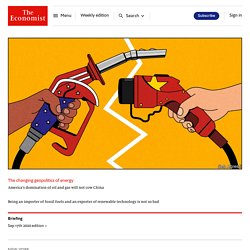
The sheer volume of hydrocarbons that such American oilmen have released from the shale beneath Midland and previously unforthcoming geology elsewhere gives substance to his boast (see chart 1). Over the past decade America’s oil output has more than doubled and its gas production increased by over 50%. America is now the world’s top producer of both fuels.
Had they heard Mr Trump say that “We will never again be reliant on hostile foreign suppliers,” presidents from Franklin Roosevelt on might have nodded in envious approval. But what it might mean to be an energy superpower is changing, thanks to three linked global shifts. A different strength. EIAS Briefing Paper 2014 7 Ebner. Climate solutions depend on rare earths. Here's how they can be sourced responsibly. The recent Intergovernmental Panel on Climate Change (IPCC) report on climate change argued that we must cut global emissions in half by 2030 in order to meet the goal of keeping global warming to 1.5 degrees Celsius as agreed to in Paris in 2015 at the Conference of the Parties to the United Nations Framework Convention on Climate Change (COP 21).
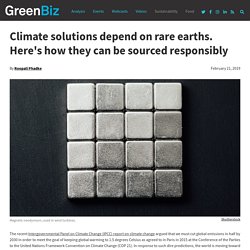
In response to such dire predictions, the world is moving toward renewable and smart technologies at an accelerating pace. Climate solutions, such as solar energy, wind energy and electric vehicles, depend on rare earth elements. These so-called "green tech metals" have unique magnetic and luminescent qualities that make them very difficult to substitute with other elements. In 2017 the World Bank launched its first major study on green tech metals. The authors argue that meeting the Paris Accord will result in skyrocketing demand for metals such as cadmium, neodymium and indium.
Repatriation Not every community wants a mine in their backyard. Crushed Rock Could Capture Billions of Tons of Carbon Dioxide. Photographer: David Ramos/Getty Images Sign up to receive the Green Daily newsletter in your inbox every weekday.
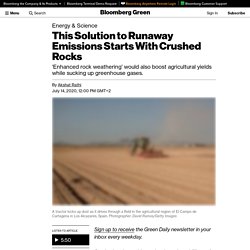
Crushed rocks could one day draw down billions of metric tons of carbon dioxide from the air. Explore dynamic updates of the earth’s key data points The idea, often referred to as “enhanced rock weathering” (ERW), is among a handful of negative-emission technologies beginning to gain traction as the world struggles to lower greenhouse gases. The idea is simple: Grinding up certain types of rock and spreading them across a large land area can accelerate the Earth’s natural rate of carbon absorption. It might sounds far-fetched, but, scientifically speaking, it could work. “Prior to our work, the evidence [on ERW] was scattered,” says David Beerling, director of Leverhulme Centre for Climate Change Mitigation at the University of Sheffield.
Here’s how it works. Mining Rare Earths for a Renewable Future: Green Insight. Photographer: Joe Buglewicz/Bloomberg Sign up to receive the Green Daily newsletter in your inbox every weekday.
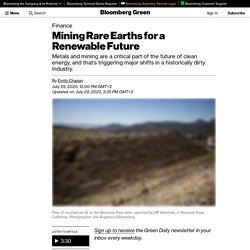
Metals and mining are a critical part of the future of clean energy, and that’s triggering major shifts in a historically dirty industry. Mined materials such as nickel, cobalt, copper, lithium, gold and rare earths are an integral part of wind turbines as well as electric grids and vehicles. They even power some of the digital technologies allowing many people to work from home. But could these products of mining ever be as sustainable as the clean energy industries they help power? Copper prices, for example, are up about 24% over the past three months, despite the coronavirus pandemic. Musk, who sells electric cars to some of the most sustainably-minded consumers out there, specifically asked for efficiently-mined nickel due to challenges in sustainable sourcing.
China is still responsible for providing about 80% of America’s rare earths imports, according to the U.S.